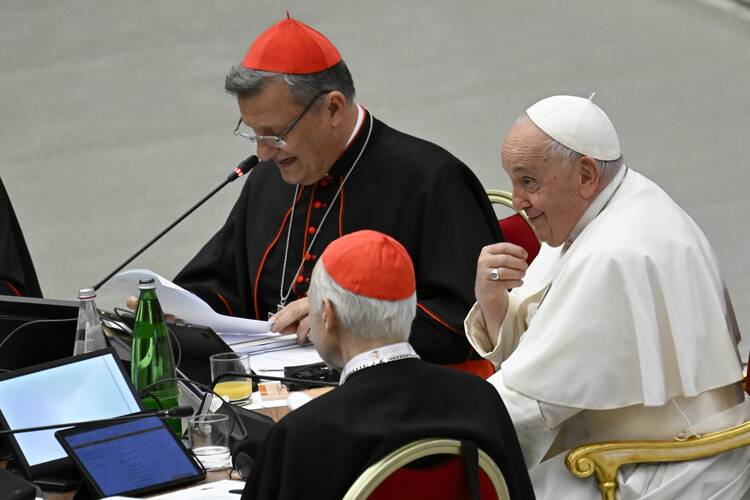
Pope Francis smiles as members of the assembly of the Synod of Bishops approach the end of their work Oct. 28, 2023, in the Paul VI Hall at the Vatican. (CNS photo/Vatican Media)
~ by Cindy Wooden, Catholic News Service
VATICAN CITY (CNS) — A report summarizing discussions at the assembly of the Synod of Bishops said the church may need more welcoming pastoral approaches, especially to people who feel excluded, but also acknowledged fears of betraying traditional church teachings and practices.
Among the topics addressed in the report were clerical sexual abuse, women’s roles in the church, outreach to poor and the concept of “synodality” itself.
After the voting on the synthesis concluded, the pope said he wanted to remind everyone that “the protagonist of the synod is the Holy Spirit.” He briefly thanked the synod officers and joined members of the assembly in giving thanks to God.
The assembly’s discussions set the stage for a year-long period of reflection that will culminate in the second and final synod assembly in late 2024 on the same topic
The 41-page synthesis report voted on paragraph-by-paragraph Oct. 28, described its purpose as presenting “convergences, matters for consideration and proposals that emerged from the dialogue” on issues discussed under the headings of synodality, communion, mission and participation.
Within the synod topics, members looked at the role of women in the church, including in decision making, and at the possibility of ordaining women deacons. The report asked for more “theological and pastoral research on the access of women to the diaconate,” including a review of the conclusions of commissions Pope Francis set up in 2016 and 2020.
The paragraph was approved 279-67, which was more than the needed two-thirds support but still garnered among the highest negative votes.
Among members of the assembly, the report said, some thought the idea of women deacons would be a break with tradition, while others insisted it would “restore the practice of the Early Church,” including at the time of the New Testament, which mentions women deacons.
Assembly members also discussed pastoral approaches to welcoming and including in the life of parishes people who have felt excluded, including the poor, people with disabilities, LGBTQ+ Catholics and Catholics whose marriages are not recognized by the church.
The report emphasized the “listening” that took place on the local, national and continental levels before the assembly and the “conversations in the Spirit” that took place during it, which involved each person speaking in his or her small group, other participants at first commenting only on what struck them, silent reflection and then discussion.
“It is clear that some people are afraid that they will be forced to change; others fear that nothing at all will change or that there will be too little courage to move at the pace of the living Tradition,” the report said.
“Also,” it added, “perplexity and opposition can sometimes conceal a fear of losing power and the privileges that derive from it.”
